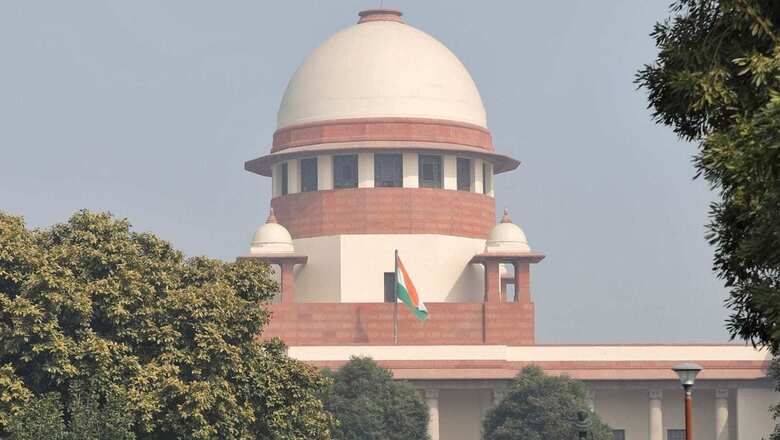
views
The Supreme Court on Friday held that a resolution suspending 12 BJP MLAs from the Maharashtra Legislative Assembly for a period of one year since July 2021 is “unconstitutional and irrational”.
A bench headed by Justice A M Khanwilkar and comprising Justices Dinesh Maheshwari and C T Ravikumar said, “In conclusion, we have no hesitation in allowing these writ petitions and the impugned resolution suspending these members beyond the period of the remainder of the concerned Monsoon session held in July 2021 is non-est in the eyes of law, nullity, unconstitutional, substantially illegal and irrational.”
The impugned resolution is thus declared to be ineffective in law in so far as the period beyond the stated session in which the resolution came to be passed.
What Was the Petition
The apex court delivered its verdict on the pleas filed by the 12 BJP MLAs, who had challenged their one-year suspension from the state assembly for allegedly misbehaving with the presiding officer. The top court said the petitioners are entitled to all consequential benefits of being the members of the legislative assembly on and after the expiry of the period of the remainder of session in July 2021.
The 12 suspended members were Sanjay Kute, Ashish Shelar, Abhimanyu Pawar, Girish Mahajan, Atul Bhatkhalkar, Parag Alavani, Harish Pimpale, Yogesh Sagar, Jay Kumar Rawat, Narayan Kuche, Ram Satpute and Bunty Bhangdia. These MLAs had filed petitions in the apex court challenging the resolution passed by the Assembly to suspend them for one year. They were suspended for one year on July 5 last year from the Assembly after the state government had accused them of misbehaving with presiding officer Bhaskar Jadhav in the Speaker’s chamber. The motion to suspend these MLAs was moved by state Parliamentary Affairs Minister Anil Parab and passed by a voice vote.
What Happened on July 5, 2021
Twelve BJP MLAs were suspended last year on July 5 for the period of one year from Maharashtra assembly for allegedly creating ruckus in ongoing monsoon session of the House and “misbehaving” with Speaker in-chair Bhaskar Jadhav. The motion to suspend the MLAs was moved by state Parliamentary Affairs Minister Anil Parab and passed by a voice vote.
To protest against the decision, BJP members had led by Devendra Fadnavis, said the Opposition will boycott the House proceedings. “This is a false allegation and an attempt to reduce the numbers of opposition benches, because we exposed the government’s falsehood on the OBC quota in local bodies,” Fadnavis said, adding that the BJP members had not abused the presiding officer.
“It was Shiv Sena MLAs who used abusive words. I brought our MLAs out of the Speaker’s chamber,” the Leader of Opposition in the House said. Ashish Shelar apologised and the matter ended, the former chief minister said, claiming that what Jadhav said was a “one-sided” account.
Later, the suspended MLAs met Governor Bhagat Singh Koshyari at Raj Bhavan in the evening, seeking his intervention and complained against the MVA government for “trampling upon democracy”.
The MLAs led by Ashish Shelar, chief whip of the BJP in the state legislature, submitted a memorandum denying “wrong” allegations of misbehaviour with the presiding officer.
The MLAs had then filed a writ petition in the Supreme Court last year against the Maharashtra Legislative Assembly and the State of Maharashtra asking for the suspension to be quashed.
Arguments and Observations During Hearing
During the arguments in the matter, the apex court had observed that suspension from legislative assembly for one year is worse than expulsion as the consequences are so dreadful and the right of a constituency to remain represented in the House is affected. The top court had observed that there is a statutory obligation to fill in a seat within six months.
It had referred to Article 190 (4) of the Constitution which says that if for a period of 60 days, a member of a House, without its permission, is absent from all meeting, the House may declare his or her seat vacant.
What has Maharashtra said in its defence
The counter-affidavit filed by the in-charge secretary of the state’s Parliamentary Affairs Department mentioned about the “undisciplined and unbecoming behaviour” of the 12 MLAs, and the fact that the Leader of Opposition had tendered an apology. Therefore, denying any violation of Article 14, it said that there was no question of hearing or furnishing of written explanations by the MLAs, who had committed contempt of the House.
The counsel for Maharashtra argued that the House had acted “within its legislative competence, and that under Article 212, courts do not have jurisdiction to inquire into the proceedings of the legislature.” Article 212 (1) says, “The validity of any proceedings in the Legislature of a State shall not be called in question on the ground of any alleged irregularity of procedure”.
Meanwhile Article 212 (2) says, “No officer or member of the Legislature…in whom powers are vested by or under this Constitution for regulating procedure or the conduct of business, or for maintaining order, in the Legislature shall be subject to the jurisdiction of any court in respect of the exercise by him of those powers.”
The counsel has also referred to Article 194 on the powers and privileges of the House, and argued that any member who transgresses these privileges can be suspended through the inherent powers of the House, thereby denying that the power to suspend a member can be exercised only through Rule 53 of the Assembly.
The length of the suspension
According to Section 151 (A) of The Representation of the People Act, 1951, “a bye-election for filling any vacancy… [in the House] shall be held within a period of six months from the date of the occurrence of the vacancy”. Therefore, no constituency can remain without a representative for more than six months unless specified under this section.
In its last hearing the bench had observed that the basic structure of the Constitution would be hit if the constituencies of the suspended MLAs remained unrepresented in the Assembly for a full year.
It also referred to Article 190 (4) of the Constitution, which says, “If for a period of sixty days a member of a House of the Legislature of a State is without permission of the House absent from all meetings thereof, the House may declare his seat vacant.”
The top court observed that the one-year suspension was “prima facie unconstitutional” as it went beyond the six-month limit, which means “not punishing the member but punishing the constituency as a whole”.
Rules on length of suspension of a MP/MLA
Rule 53 of Maharashtra Assembly states that the “Speaker may direct any member who refuses to obey his decision, or whose conduct is, in his opinion, grossly disorderly, to withdraw immediately from the Assembly”.
The member must “absent himself during the remainder of the day’s meeting”. Should any member be ordered to withdraw for a second time in the same session, the Speaker may direct the member to absent himself “for any period not longer than the remainder of the Session”.
Meanwhile, Rules 373, 374, and 374A of the Rules of Procedure and Conduct of Business in Lok Sabha provide for the withdrawal of a member whose conduct is “grossly disorderly”, and suspension of one who abuses the rules of the House or willfully obstructs its business.
The maximum suspension as per these Rules is “for five consecutive sittings or the remainder of the session, whichever is less”.
The maximum suspension for Rajya Sabha under Rules 255 and 256 also does not exceed the remainder of the session.
Similar Rules also are in place for state legislative assemblies and councils which prescribe a maximum suspension not exceeding the remainder of the session.
Read all the Latest Politics News here



















Comments
0 comment